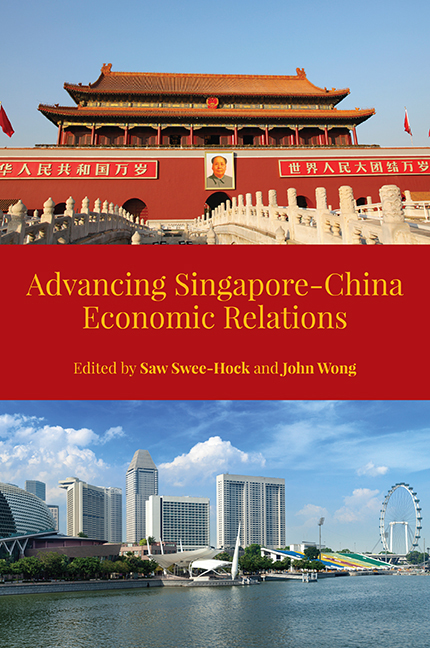Book contents
- Frontmatter
- Contents
- List of Tables
- List of Figures
- Preface
- The Contributors
- 1 Evolution of Singapore-China Economic Relations
- 2 The Political Economy of Singapore's Unique Relations with China
- 3 Suzhou Industrial Park: Going Beyond a Commercial Project
- 4 Translating Concept into Practice: Sino-Singapore Tianjin Eco-City Project
- 5 China's Foreign Direct Investment in Singapore since the 2000s
- 6 Singapore's Direct Investment in China since the 1980s
- 7 Singapore-China Trade and CSFTA
- 8 Growth of Tourism between China and Singapore
- 9 Enhancing Educational Collaborations between China and Singapore
- Index
1 - Evolution of Singapore-China Economic Relations
Published online by Cambridge University Press: 21 October 2015
- Frontmatter
- Contents
- List of Tables
- List of Figures
- Preface
- The Contributors
- 1 Evolution of Singapore-China Economic Relations
- 2 The Political Economy of Singapore's Unique Relations with China
- 3 Suzhou Industrial Park: Going Beyond a Commercial Project
- 4 Translating Concept into Practice: Sino-Singapore Tianjin Eco-City Project
- 5 China's Foreign Direct Investment in Singapore since the 2000s
- 6 Singapore's Direct Investment in China since the 1980s
- 7 Singapore-China Trade and CSFTA
- 8 Growth of Tourism between China and Singapore
- 9 Enhancing Educational Collaborations between China and Singapore
- Index
Summary
Background
The origin of official bilateral relations between Singapore and China can be traced to 3 October 1990 when the two countries finally established diplomatic ties. Singapore had decided to be the last among the major countries in Southeast Asia to formalize relations with the People's Republic of China as it wished to ease the concerns of the neighbouring states which had encountered some difficult times during the Cold War days in the 1950s to the 1970s. Bilateral contacts between the tiny city-state and the giant country endowed with a huge population, vast land area, and an enormous economy have in fact taken place before the official recognition of one another. The more important events were the first state delegation led by the then Singapore Minister for Foreign Affairs S. Rajaratnam in 1975, the then Prime Minister Lee Kuan Yew's first visit in 1976, the exchange of Trade Representatives in 1981, and the establishment of direct air links in 1985 with Singapore Airlines (SIA) flying to Beijing and Shanghai and Chinese airlines coming to Singapore. Another noteworthy event occurred in 1985 when the late Dr Goh Keng Swee, the then Deputy Prime Minister and Finance Minister of Singapore, was appointed by the Chinese Government as an Adviser to the development of the coastal states and economic zones in mainland China.
What eventually proved to be a significant occasion was the landmark visit of paramount leader Deng Xiaoping to the island-state in November 1978. The visit of Deng Xiaoping was carefully planned to allow him ample time to meet with the then Prime Minister Lee Kuan Yew and his top leaders and to give him sufficient time to observe the achievements in the various areas of social and economic development since the attainment of independence in August 1965. He was certainly impressed by what he saw in his various itineraries as proof of the remarkable socio-economic progress chalked up by the city-state within such a short period of time.
- Type
- Chapter
- Information
- Advancing Singapore-China Economic Relations , pp. 1 - 30Publisher: ISEAS–Yusof Ishak InstitutePrint publication year: 2014



